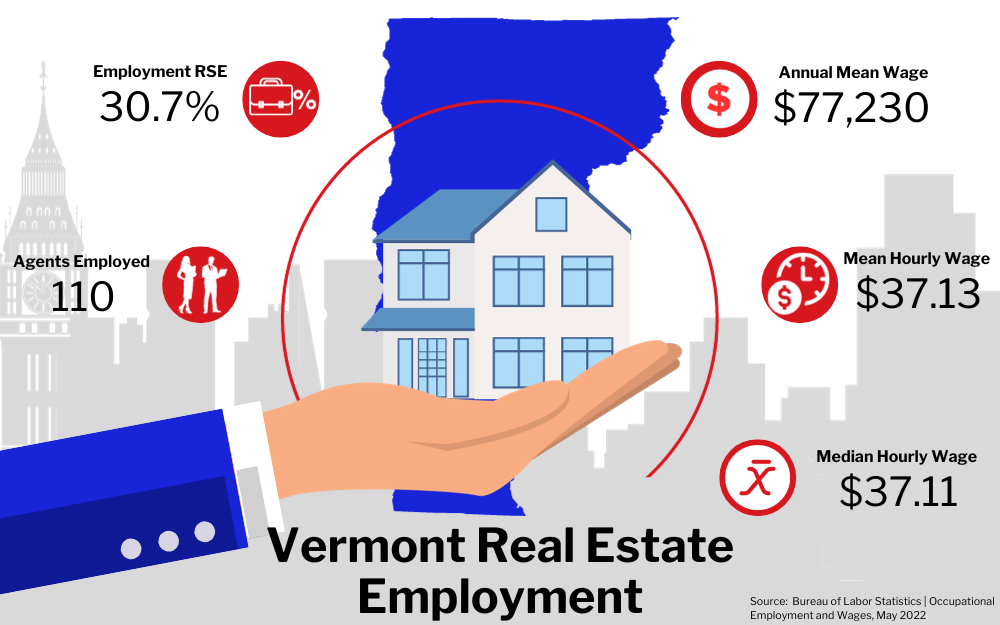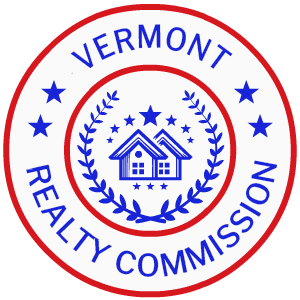
To become a successful real estate agent in the picturesque state of Vermont, you must understand how to sell real estate as per the state guidelines. With property prices ranging between $300,000 and $350,000, learning real estate skills can present you with limitless opportunities to grow and succeed.1
But what do you need to become a real estate agent in Vermont? This comprehensive guide explores the real estate program in Vermont and explains how to get into real estate as an independent real estate agent or under a broker.2
Getting a Real Estate License in Vermont
Although different states have their unique processes of getting real estate licenses, Vermont has the easiest process of all. You only need to meet all the requirements and send your application through an online portal.3
These basic requirements include:
- Be at least 18 years old
- Have a high school diploma
- Complete a 40-hour real estate educational course in approved education providers
- Pass the national and state exams
- Find a Vermont-based broker for affiliation
Once you’ve met all these requirements and gone through the entire application process, the Office of Professional Regulation will require you to complete a post-licensing course before you start indulging in the real estate business.
Core Standards for Real Estate License Eligibility
The first step into getting a real estate license in Vermont is to do a pre-licensing course as prescribed in the state guidelines for real estate agents. Of course, you must have met all the minimum requirements regarding age and foundational education.
Secondly, you must be a Vermont resident and a legal citizen in the US. If you are moving from another state to Vermont, you should first establish residency in Vermont before you apply.
However, if you already have a real estate license from another state, you may need to contact the OPR for guidance before you start practicing as a real estate agent in Vermont. The OPR will check your license and determine whether your original state is equivalent to Vermont’s.
If it is, you’ll only do the state exam to check your familiarity with the state guidelines. But, if your original state is not equivalent to Vermont’s, you must complete the 40-hour course and do both the national and state exams.
Some states not equivalent to Vermont include New York, West Virginia, Puerto Rico, and California.
Required Age and Elementary Educational Stipulations
The work of a real estate agent involves interacting with people at all levels as you help them buy and sell property. Hence, the Vermont Office of Professional Regulation has set the minimum age limit at 18 years to ensure all applicants are responsible adults.
Similarly, the minimum requirement for foundational education is a high school diploma.
You can also present your GED certifications or any equivalent. For instance, if you went through a state-approved home-schooling program, you can provide proof of completion to show your academic background.
Mandatory Training Period for Licensing
In Vermont, you must complete 40 hours of coursework to qualify for real estate licensing. You have the option to do the courses online or in a physical classroom approved by the Office of Professional Regulation.4
The real estate course has the following approved topics:5
- Agency relationships and contracts
- Finance
- Real property ownership and interest
- Real property
- Real estate calculations
- Property Management
- Marketing Regulations
- The Real Estate Commission
- Regulations governing the activities of licensees
- Licensure
- Related Law
- Broker topics
You can find all the approved courses on the OPR profession website, where you can search the courses depending on the profession.6
Unlike other states that offer a pre-licensing course and let you start working after licensing, Vermont has a mandatory 8-hour post-licensing course that you must undergo after you get your license. The course is intended to help you understand real estate laws in the state.
Investment Required for Real Estate School Pre-License Course
The cost of the real estate pre-license course in Vermont varies depending on where you are doing the course and the mode of learning. For example, the cost of doing the course online may be different from the one that requires physical attendance.
The average course tuition fee ranges from $275 to $475. Online course providers are cheaper and package the course in such a way that you can do it at your own pace until you complete it.
Also, they include an exam preparation course that has sample exam questions, so you know what to expect in the exam.
Besides the approved course for real estate licensing, online education providers may have other real estate courses you can take for free. While these courses may not constitute the exam, they can help you gain more knowledge on the real estate market in Vermont and sharpen your skills as a real estate agent.
After completing the training, you can pay for the VT Real Estate Licensing Exam, usually in two parts. The national portion of the exam is done on the PSI exam website, and the fee is $110.
On the other hand, the state portion of the exam is done on the application portal on the OPR website as you submit your application.
The exam fee for the state exam is part of the license application fee, which is $50. If you fail the exam, you must pay again because the fees are non-refundable.
Needed Real Estate Background Screening (Fingerprint Station Details)
Before you submit a Vermont real estate license application, you have to visit an identification center where you can submit your fingerprints to the FBI directly.7 The bureau will run a background check and get back to you with a report.
Do you have a criminal record and wonder whether it can stop you from getting a real estate license in Vermont? Well, most crimes like misdemeanors are often overlooked, especially if they happened one time and you have already served the judgment.
What disqualifies you from being a real estate agent in Vermont is having a felony conviction, forgery, embezzlement, fraud, or obtaining money by false pretense. Such crimes pose a threat to your career, and the OPR may reject your application.
If you have a criminal record and would like to apply for a real estate license in Vermont, ensure that you write clear explanations to the Office of Professional Regulation detailing the charge and the circumstances around it.
Can You Get a Real Estate License in a State You Don't Live In?
Yes, you can. Although Vermont doesn’t have reciprocity with other states, there are states that allow their residents to get real estate licenses in states they don’t live in. If you are in another state and would like to have a real estate license in Vermont, you must move permanently to Vermont and be a resident.
What’s the Difference Between a Realtor® and a Real Estate Agent?
A real estate agent is a person licensed by the state to conduct real estate business under a broker. A Realtor® is a real estate broker or agent registered with the National Association of REALTORS®.
What Professional License Can a Convicted Felon Get?
Vermont Office of Profession Regulation doesn’t consider many crimes as a reason to deny you a real estate license. However, if you were convicted of forgery, fraud, and obtaining money by false pretense, it can stop you from getting a license.
How Hard Is It To Get a Real Estate License?
In Vermont, the process of getting a real estate license is straightforward, and you can get it within a few weeks. If you focus on the course, you learn how to sell real estate, how to invest in real estate with little money, and other facts about real estate agents.
How Long Is the Training for Real Estate Agents?
To qualify for a real estate license in Vermont, you must complete 40 hours of coursework and cover all the state-approved topics before taking national and Vermont state exams. Some states require longer or shorter coursework hours, depending on the state laws governing the real estate sector.
References
1World Population Review. (2023). Housing costs by State [Updated January 2023]. Worldpopulationreview. Retrieved October 29, 2023, from <https://worldpopulationreview.com/state-rankings/housing-costs-by-state>
2State of Vermont. (2023). Salesperson & Broker FAQs. Vermont Secretary of State. Retrieved November 15, 2023, from <https://sos.vermont.gov/real-estate-brokers-salespersons/salesperson-broker-faqs/#q11>
3Rodriguez, K. (2023). How to Get Your Vermont Real Estate License. Staterequirement. Retrieved October 29, 2023, from <https://staterequirement.com/real-estate/vermont-real-estate-license/>
4State of Vermont. (2023). Approved Education Provider List. Office of Professional Regulation. Retrieved November 15, 2023, from <https://www.ziprecruiter.com/Salaries/Real-Estate-Agent-Salary--in-Vermont>
5Baker, G. (2023). How to get your Vermont Real Estate License 2023. Fitsmallbusiness. Retrieved October 29, 2023, from <https://fitsmallbusiness.com/real-estate-license-vermont/https://sos.vermont.gov/media/0c0e3ew3/approved-education-provider-list-updated-2-2-17.pdf>
6State of Vermont. (2023). Course Search. Office of Professional Regulation. Retrieved November 15, 2023, from <https://secure.professionals.vermont.gov/prweb/PRServletCustom/app/NGLPGuestUser/V9csDxL3sXkkjMC_FR2HrA*/!STANDARD?UserIdentifier=Coursesearchguestuser>
7State of Vermont. (2021, February 16). Identification Centers. Vermont Department of Public Safety. Retrieved November 15, 2023, from <https://vcic.vermont.gov/sites/vcic/files/files/record-check/2019%20Identification%20Centers.pdf>
